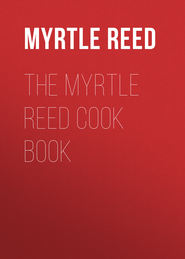По всем вопросам обращайтесь на: info@litportal.ru
(©) 2003-2024.
✖
The Master's Violin
Автор
Год написания книги
2017
Настройки чтения
Размер шрифта
Высота строк
Поля
“She’s not really your aunt, then?”
“No. Legally, I am her daughter, but she wouldn’t want me to call her ‘mother,’ even if I could.”
The talk in the other room had become merely monosyllables, with bits of understanding silence between. Iris went back, and Mrs. Irving thanked her prettily for the song.
“Thank you for listening,” she returned.
“Come, Aunt Peace, you’re nodding.”
“So I was, dearie. Is it late?”
“It’s almost ten.”
In her stately fashion, Miss Field bade her guests good night. Iris lit a candle and followed her up the broad, winding stairway. It made a charming picture – the old lady in her trailing gown, the light throwing her white hair into bold relief, and the girl behind her, smiling back over the banister, and waving her hand in farewell.
In Lynn’s fond sight, his mother was very lovely as she sat there, with the firelight shining upon her face. He liked the way her dark hair grew about her low forehead, her fair, smooth skin, and the mysterious depths of her eyes. Ever since he could remember, she had worn a black gown, with soft folds of white at the throat and wrists.
“It’s time to go out for our walk now,” he said.
“Not to-night, son. I’m tired.”
“That doesn’t make any difference; you must have exercise.”
“I’ve had some, and besides, it’s wet.”
Lynn was already out of hearing, in search of her wraps. He put on her rubbers, paying no heed to her protests, and almost before she knew it, she was out in the April night, woman-like, finding a certain pleasure in his quiet mastery.
The storm was over and the hidden moon silvered the edges of the clouds. Here and there a timid planet looked out from behind its friendly curtain, but only the pole star kept its beacon steadily burning. The air was sweet with the freshness of the rain, and belated drops, falling from the trees, made a faint patter upon the ground.
Down the long elm-bordered path they went, the boy eager to explore the unfamiliar place; the mother, harked back to her girlhood, thrilled with both pleasure and pain.
Happy are they who leave the scenes of early youth to the ministry of Time. Going back, one finds the river a little brook, the long stretch of woodland only a grove in the midst of a clearing, and the upland pastures, that once seemed mountains, are naught but stony, barren fields.
As they stood upon the bridge, looking down into the rushing waters, Margaret remembered the lost majesty of that narrow stream, and sighed. The child who had played so often upon its banks had grown to a woman, rich with Life’s deepest experiences, but the brook was still the same. Through endless years it must be the same, drawing its waters from unseen sources, while generation after generation withered away, like the flowers that bloomed upon its grassy borders while the years were young.
Lynn broke rudely into her thoughts. “I wish I’d known you when you were a kid, mother,” he said.
“Why?”
“Oh, I think I’d have liked to play with you. We could have made some jolly mud pies.”
“We did, but you were three, and I was twenty-five. Much ashamed, too, I remember, when your father caught me doing it.”
“Am I like him?”
He had asked the question many times and her answer was always the same. “Yes, very much like him. He was a good man, Lynn.”
“Do I look like him?”
“Yes, all but your eyes.”
“When you lived here, did you know Herr Kaufmann?”
“By sight, yes.” He was looking straight at her, but she had turned her face away, forgetting the darkness. “We used to see him passing in the street,” she went on, in a different tone. “He was a student and never seemed to know many people. He would not remember me.”
“Then there’s no use of my telling him who I am?”
“Not the least.”
“Maybe he won’t take me.”
“Yes, he will,” she answered, though her heart suddenly misgave her. “He must – there is no other way.”
“Will you go with me?”
“No, indeed; you must go alone. I shall not appear at all.”
“Why, mother?”
“Because.” It was her woman’s reason, which he had learned to accept as final. Beyond that there was no appeal.
East Lancaster lay on one side of the brook and West Lancaster on the other. The two settlements were quite distinct, though they had a common bond of interest in the post-office, which was harmoniously situated near the border line. East Lancaster was the home of the aristocracy. Here were old Colonial mansions in which, through their descendants, the builders still lived. The set traditions of a bygone century held full sway in the place, but, though circumscribed by conditions, the upper circle proudly considered itself complete.
West Lancaster was on a hill, and a steep one at that. Hardy German immigrants had settled there, much to the disgust of East Lancaster, holding itself sternly aloof year after year. It was not considered “good form” to allude to the dwellers upon the hill, save in low tones and with lifted brows, yet there were not wanting certain good Samaritans who sent warm clothing and discarded playthings, after nightfall and by stealth, to the little Teutons who lived so near them.
Hemmed in by the everlasting hills, estranged from its neighbour, and barely upon speaking terms with other towns, East Lancaster let the world go on by. Two trains a day rushed through the station, for the main line of the railroad, receiving no encouragement from East Lancaster, had laid its tracks elsewhere. It was still spoken of as “the time when, if you will remember, my dear, they endeavoured to ruin our property with dirt and noise.”
“Her clothes are like her name,” remarked Lynn.
“Whose clothes?” asked Mrs. Irving, taken out of her reverie.
“That girl’s. She had on a green dress, and some yellow velvet in her hair. Her eyes are purple.”
“Violet, you mean, dear. Did you notice that?”
“Of course – don’t I notice everything? Come, mother; I’ll race you to the top of the hill.”
Once again her objections were of no avail. Together they ran, laughing, up the winding road that led to the summit, stopping very soon, however, and going on at a more moderate pace.
The street was narrow, and the houses on either side were close together. Each had its tiny patch of ground in front, laid out in flower-beds bordered with whitewashed stones, in true German fashion. There were no street lamps, for West Lancaster also resented all modern innovations, but in the Spring night one could see dimly.
Lanterns flitted here and there, like fireflies starred against the dark. Margaret protested that she was tired, but Lynn put his arm around her and hurried her on. Never before had she set foot upon the soil of West Lancaster, but she had full knowledge of the way.
The brow of the hill was close at hand, and she caught her breath in sudden fear. Lynn, in the midst of a graphic recital of some boyish prank, took no note of her agitation. He did not even know that they had come to the end of their journey, until a man tiptoed toward them, his finger upon his lips.
“Hush!” he breathed. “The Master plays.”
At the very top of the hill, almost at the brink of the precipice, was a house so small that it seemed more like a box than a dwelling. In the street were a dozen people, both men and women, standing in stolid patience. The little house was dark, but a window was open, and from within, muted almost to a whisper, came the voice of a violin.











